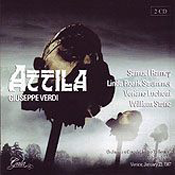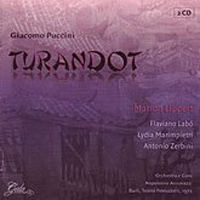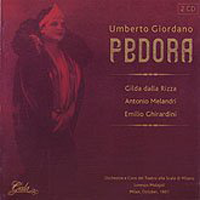
24 Jan 2008
Italian opera on Gala
The budget label Gala purveys live performances both historic and relatively recent; of the three discussed here, the La Scala Fedora dates back to 1931, while the Attila comes from a 1987 La Fenice performance.
The Sixteen continues its exploration of Henry Purcell’s Welcome Songs for Charles II. As with Robert King’s pioneering Purcell series begun over thirty years ago for Hyperion, Harry Christophers is recording two Welcome Songs per disc.
In February this year, Albanian soprano Ermonela Jaho made a highly lauded debut recital at Wigmore Hall - a concert which both celebrated Opera Rara’s 50th anniversary and honoured the career of the Italian soprano Rosina Storchio (1872-1945), the star of verismo who created the title roles in Leoncavallo’s La bohème and Zazà, Mascagni’s Lodoletta and Puccini’s Madama Butterfly.
Collapsology. Or, perhaps we should use the French word ‘Collapsologie’ because this is a transdisciplinary idea pretty much advocated by a series of French theorists - and apparently, mostly French theorists. It in essence focuses on the imminent collapse of modern society and all its layers - a series of escalating crises on a global scale: environmental, economic, geopolitical, governmental; the list is extensive.
Amongst an avalanche of new Mahler recordings appearing at the moment (Das Lied von der Erde seems to be the most favoured, with three) this 1991 Mahler Second from the 2nd Kassel MahlerFest is one of the more interesting releases.
If there is one myth, it seems believed by some people today, that probably needs shattering it is that post-war recordings or performances of Wagner operas were always of exceptional quality. This 1949 Hamburg Tristan und Isolde is one of those recordings - though quite who is to blame for its many problems takes quite some unearthing.
The voices of six women composers are celebrated by baritone Jeremy Huw Williams and soprano Yunah Lee on this characteristically ambitious and valuable release by Lontano Records Ltd (Lorelt).
As Paul Spicer, conductor of the Royal Birmingham Conservatoire Chamber Choir, observes, the worship of the Blessed Virgin Mary is as ‘old as Christianity itself’, and programmes devoted to settings of texts which venerate the Virgin Mary are commonplace.
Ethel Smyth’s last large-scale work, written in 1930 by the then 72-year-old composer who was increasingly afflicted and depressed by her worsening deafness, was The Prison – a ‘symphony’ for soprano and bass-baritone soloists, chorus and orchestra.
‘Hamilton Harty is Irish to the core, but he is not a musical nationalist.’
‘After silence, that which comes closest to expressing the inexpressible is music.’ Aldous Huxley’s words have inspired VOCES8’s new disc, After Silence, a ‘double album in four chapters’ which marks the ensemble’s 15th anniversary.
A song-cycle is a narrative, a journey, not necessarily literal or linear, but one which carries performer and listener through time and across an emotional terrain. Through complement and contrast, poetry and music crystallise diverse sentiments and somehow cohere variability into an aesthetic unity.
One of the nicest things about being lucky enough to enjoy opera, music and theatre, week in week out, in London’s fringe theatres, music conservatoires, and international concert halls and opera houses, is the opportunity to encounter striking performances by young talented musicians and then watch with pleasure as they fulfil those sparks of promise.
“It’s forbidden, and where’s the art in that?”
Dublin-born John F. Larchet (1884-1967) might well be described as the father of post-Independence Irish music, given the immense influenced that he had upon Irish musical life during the first half of the 20th century - as a composer, musician, administrator and teacher.
The English Civil War is raging. The daughter of a Puritan aristocrat has fallen in love with the son of a Royalist supporter of the House of Stuart. Will love triumph over political expediency and religious dogma?
Beethoven Symphony no 9 (the Choral Symphony) in D minor, Op. 125, and the Choral Fantasy in C minor, Op. 80 with soloist Kristian Bezuidenhout, Pablo Heras-Casado conducting the Freiburger Barockorchester, new from Harmonia Mundi.
A Louise Brooks look-a-like, in bobbed black wig and floor-sweeping leather trench-coat, cheeks purple-rouged and eyes shadowed in black, Barbara Hannigan issues taut gestures which elicit fire-cracker punch from the Mahler Chamber Orchestra.
‘Signor Piatti in a fantasia on themes from Beatrice di Tenda had also his triumph. Difficulties, declared to be insuperable, were vanquished by him with consummate skill and precision. He certainly is amazing, his tone magnificent, and his style excellent. His resources appear to be inexhaustible; and altogether for variety, it is the greatest specimen of violoncello playing that has been heard in this country.’
Baritone Roderick Williams seems to have been a pretty constant ‘companion’, on my laptop screen and through my stereo speakers, during the past few ‘lock-down’ months.
Melodramas can be a difficult genre for composers. Before Richard Strauss’s Enoch Arden the concept of the melodrama was its compact size – Weber’s Wolf’s Glen scene in Der Freischütz, Georg Benda’s Ariadne auf Naxos and Medea or even Leonore’s grave scene in Beethoven’s Fidelio.

The budget label Gala purveys live performances both historic and relatively recent; of the three discussed here, the La Scala Fedora dates back to 1931, while the Attila comes from a 1987 La Fenice performance.
As with most of their sets, for the 1972 Turandot Gala offers the complete performance and then fills the second disc up with extracts from performances by one of the key singers from the title performance.
But Gala doesn’t follow this practice for the Attila, oddly enough, since it preserves a great performance from Samuel Ramey. The bonus cuts here go to well-known artists from the same era as those of the Attila. From performances under Claudio Abbado at La Scala in 1979, we hear Placido Domingo in Luisa Miller, and a trio of Don Carlos arias, featuring Yevgeny Nestrenko, Leo Nucci, and Katia Ricciarelli. Piero Cappucilli closes the CD with an elegant “Eri tu” from Un ballo en Maschera.
However, after hearing this rough but exciting Attila, closing the set with some more Ramey, or at least excerpts from other early or rare Verdi, would have been wonderful. Be that as it may, the opera has the benefit here of a fiery live performance, recorded in clean if not expansive sound. Ramey has the audience on his nasty Hun side from the beginning, and a raucous crowd demands a bis of “Oltre a quel limite t’attendo.” Some may regret the current state of the singer’s voice, but here the enveloping darkness of his bass is firm and yet flexible. Another American sings Odabella — Linda Roark Strummer. She has a wild, apparently huge voice. While not exactly refined, her lunging high notes and aggressive approach suit the character. Veriano Luchetti, as Foresto, brings a reliably vivid Italian tenor sound to the mix. William Stone is a capable if somewhat bland Ezio. The chorus and orchestra know the idiom and perform it with exuberant professionalism, under the baton of Gabriele Ferro.
 The 1972 Turandot, recorded at the Teatro Petruzzelli, suffers
from poor sound, with the source apparently being an audience member (if the
occasional chatter is any clue). Often the singers seem to be caught in a
stage position that allows the orchestra to cover their voices. In a few
places the tapes seem to have deteriorated, leading to sudden jumps. At any
rate, the performance, while decent, hardly suggests that the unsatisfactory
sound is any tragedy. Gala gives star billing to Marion Lippert, a German
soprano whose career eventually took her to a couple dozen performances at
the Metropolitan Opera. The booklet essay quotes some reviews that praise her
stage demeanor in the role, which obviously cannot be evaluated in this
recording. Although not uncomfortable with the role’s challenges, she brings
little that is individual. Flaviano Labó ducks a couple of optional high
notes, but he sings a handsome, manly Calaf. Lydia Marimpietri earns the
usual happy applause for Liu’s melodic, sad arias. She is fine, but the
applause really should go to the composer. With the sound in its lamentable
state, making judgments about Napoleone Annovazzi and the theater orchestra
would be unfair.
The 1972 Turandot, recorded at the Teatro Petruzzelli, suffers
from poor sound, with the source apparently being an audience member (if the
occasional chatter is any clue). Often the singers seem to be caught in a
stage position that allows the orchestra to cover their voices. In a few
places the tapes seem to have deteriorated, leading to sudden jumps. At any
rate, the performance, while decent, hardly suggests that the unsatisfactory
sound is any tragedy. Gala gives star billing to Marion Lippert, a German
soprano whose career eventually took her to a couple dozen performances at
the Metropolitan Opera. The booklet essay quotes some reviews that praise her
stage demeanor in the role, which obviously cannot be evaluated in this
recording. Although not uncomfortable with the role’s challenges, she brings
little that is individual. Flaviano Labó ducks a couple of optional high
notes, but he sings a handsome, manly Calaf. Lydia Marimpietri earns the
usual happy applause for Liu’s melodic, sad arias. She is fine, but the
applause really should go to the composer. With the sound in its lamentable
state, making judgments about Napoleone Annovazzi and the theater orchestra
would be unfair.
 Surprisingly, the audio on the 1931 La Scala Fedora prompts no
complaints, especially after that Turandot. This is not a live
recording, but the notes do not establish a provenance. Within a few seconds
of the opera’s beginning, the ears adjust to the limited spectrum, although
at places greater orchestral detail would be desired. That is due to the
naturalness and devotion conductor Lorenzo Molajoli brings to Giordano’s
score. Fedora at this date seems unlikely to ever attain a firm
place in the repertory, but heard here, it is possible to understand that at
one time, it seemed to have earned that distinction. A short opera with a
confusing, unconvincing libretto, it needs performers who truly believe in
it. There is true “golden age” glamour in the singing of Gilda dalla Rizza,
the Fedora whose revenge for her fiance’s death leads to her own suicide when
she realizes she has destroyed the loved ones of the killer she has come to
love. A tight vibrato and crisp enunciation give her performance a
conversational quality, although she certainly lets fly with some passionate
outbursts. The heart of the opera, a long duet in act two, finds her
well-matched with the Loris of Antonio Melandri. He gives out almost as many
sobs as he does ringing high notes, but in the red-blooded context of this
opera, his handsome voice can be excused some excess.
Surprisingly, the audio on the 1931 La Scala Fedora prompts no
complaints, especially after that Turandot. This is not a live
recording, but the notes do not establish a provenance. Within a few seconds
of the opera’s beginning, the ears adjust to the limited spectrum, although
at places greater orchestral detail would be desired. That is due to the
naturalness and devotion conductor Lorenzo Molajoli brings to Giordano’s
score. Fedora at this date seems unlikely to ever attain a firm
place in the repertory, but heard here, it is possible to understand that at
one time, it seemed to have earned that distinction. A short opera with a
confusing, unconvincing libretto, it needs performers who truly believe in
it. There is true “golden age” glamour in the singing of Gilda dalla Rizza,
the Fedora whose revenge for her fiance’s death leads to her own suicide when
she realizes she has destroyed the loved ones of the killer she has come to
love. A tight vibrato and crisp enunciation give her performance a
conversational quality, although she certainly lets fly with some passionate
outbursts. The heart of the opera, a long duet in act two, finds her
well-matched with the Loris of Antonio Melandri. He gives out almost as many
sobs as he does ringing high notes, but in the red-blooded context of this
opera, his handsome voice can be excused some excess.
The conclusion of Fedora takes up fewer that 15 minutes of the second disc. Once again, in filling out the side Gala wanders away from the stars of the main opera. Here the star becomes Lina Brusa-Rasa (although she gets no mention in the booklet, which does contain an admirably dense and detailed synopsis of Fedora, by Andrew Palmer). Lengthy highlights from an Andrea Chenier, also from La Scala in 1931, have the unfortunate effect of making the preceding Fedora seem even slighter. Bruna-Rasa is authoritative and affecting, and well-partnered by Luigi Marini as Chénier and Carlo Galeffi as Gérard. The lovers’ final duet might be worth the price of the set for some — urgently paced and thrillingly sung. After that, Gala still has room for arias from Mefistofele, Aida (actually the third act duet with the Amonasro of Galeffi), Cavalleria Rusticana, Manon Lescaut, and Tosca. Bruna-Rasa sings them all with both passion and taste, her very womanly tone mature only in the sense of ripeness and security.
So the Attila and Fedora earn recommendations to anyone interested in the operas or the singers. The Turandot would only find favor with any fans of Marion Lippert.
Chris Mullins